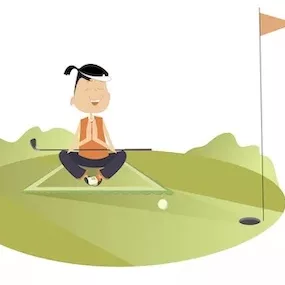
Negative thinking will wreck your game! Positive golf thoughts, on the other hand, helps players maintain a confident and focused mindset, which can lead to better performance on the golf course.
A positive attitude can also help golfers stay calm under pressure, recover more quickly from mistakes, and maintain a more consistent level of play. In addition, having a positive outlook can also help players enjoy the game more, which can lead to increased motivation and engagement.
How can positive golf thoughts help my golf game?
There are a number of benefits of being a positive thinker on the golf course.
Improved performance and consistent level of play: A positive mindset can help golfers stay focused and confident, which can lead to better performance on the course. Staying positive can help players maintain a consistent level of play, which can make it easier to break through performance plateaus.
Increased motivation and enjoyment: When golfers believe that they can play well, they may start noticing they are more motivated to practice and improve. When players think positive and are not too hard on themselves, they are more likely to enjoy the game.
Reduced stress and better recovery: Thinking positively can help players stay calm under pressure, which can lead to improved performance and enjoyment of the game. A positive mindset along with other coping skills can make players more resilient, helping them to bounce back from tough rounds, poor shots or other setbacks.
The power of positive thinking
The idea that positive thinking can lead to better outcomes is supported by a growing body of scientific research. Positive thoughts are associated with the release of certain neurotransmitters and hormones in the brain, such as dopamine and serotonin, which are linked to positive emotions and well-being. When these chemicals are released in the brain, they can help to improve mood, reduce stress and anxiety, and increase motivation and energy levels.
Studies also show that positive thoughts can affect how the brain processes information. Research has shown that people who have a positive outlook tend to process information more efficiently, make more accurate judgments, and have better problem-solving skills.
Additionally, studies have shown that positive thinking can have a beneficial impact on physical health. Positive thoughts have been associated with improved immune function, lower blood pressure, and reduced risk of cardiovascular disease. Additionally, positive thoughts can also lead to better sleep, which can have a positive impact on physical and mental well-being.
The science behind the power of positive thought suggests that positive thoughts can lead to better mental and physical health, improved cognitive function, and better overall quality of life. Positive thinking can also lead to better decision-making, focus, and a better outcome in sports performance.
5 Tips for improving Focus in Golf.
Techniques for positive thinking

Visualization
It may be beneficial to practice visualization and mindfulness techniques before, during, and after a round. Visualizing yourself performing at your best can help to build confidence and reduce the effects of negative self-talk. Here is another article to help you learn about visualization for your golf game.
Mindfulness
Be mindful can help you stay present and focus on the present shot, instead of dwelling on past mistakes or future outcomes. Become aware of negative self-talk and other negative emotions by paying attention to thoughts and feelings that come up during a round. Once you recognize the behavior, you can challenge and reframe it.
Being present while playing golf is important because it helps to improve focus and concentration, which are essential to good shot execution. When you are present, you are able to make more accurate judgments, identify what’s important and tune out distractions. This leads to better decision making, and less prone to be affected by negative thoughts. Being present can also help you to stay in the zone, which is a state of optimal performance, where the mind and body are working together seamlessly.
Goal-setting
Another strategy is to set specific, achievable goals for each round. This can help to reduce the pressure to perform perfectly and instead focus on progress and improvement. It also gives something to look forward and focus on.
Affirmations and mantras
Practice positive self-talk. Develop positive affirmations, phrases, or mantras that you can repeat to yourself as a way of countering negative thoughts. These positive words or phrases can be things like “I am a strong and capable golfer,” “I trust in my abilities,” or “I can handle any challenge that comes my way.”

Here is a full guide on Mental Training for Your Golf Game!
Abandon negative self-talk
Negative self-talk can be a common problem for golfers, especially when they are in the midst of a round.
One of the main causes of negative self-talk is fear of failure. Golfers may doubt their abilities and fear making a mistake, which can lead to them engaging in negative self-talk.
Perfectionism can also contribute to negative self-talk, when golfers place too much pressure on themselves to perform perfectly, they may engage in negative self-talk when things don’t go as planned.
Golfers who lack confidence in their abilities may also engage in negative self-talk as a way of talking themselves out of taking risks or trying new things. Negative events, such as blowing a lead or hitting a poor shot, can also lead to negative self-talk.
Negative self-talk is a habit, however, it can be changed with conscious effort and psychological support if needed. Connecting with a sports psychologist or a mental performance coach, who specializes in working with athletes and golfers, could be a great way to gain more understanding of your own mental game, and then to develop specific strategies that would work for you to counteract negative self-talk.
The importance of reframing negative thoughts
Reframing negative thoughts when playing golf is important because negative thoughts can have a significant impact on a golfer’s performance and mental state. Negative thoughts can lead to feelings of anxiety, stress, and self-doubt which can in turn, affect a golfer’s focus, confidence, and ability to perform at their best. Negative thoughts can also lead to a negative spiral where one negative thought leads to another and another, which can cause a golfer to lose their mental composure and make mistakes.
Reframing negative thoughts can help break this cycle by replacing negative thoughts with more positive imagery and constructive thoughts, which can help to improve a golfer’s mental attitude.
By reframing negative thoughts, golfers can improve their focus and concentration, develop a more positive mindset, and increase their overall confidence. These factors can help to reduce the impact of negative thoughts on a golfer’s game and ultimately, improve their performance.
How to reframe negative thoughts
Reframing negative thoughts when playing golf is a process of recognizing negative thoughts, challenging them, and replacing them with more positive and constructive thoughts.
Once you are aware of negative self-talk, you can start to question the validity of the thought. Are there any facts or evidence that support the thought? Is there another way of looking at the situation?
Once you have questioned the negative thought, you can replace it with a more positive and constructive one. For example, instead of saying “I always choke under pressure,” you could replace it with “I’ve had some difficult moments, but I’ve also had successes in the past, I can do this.”
Negative thoughts often come from dwelling on past mistakes or worrying about future outcomes. Instead, try to focus on the present moment, and the task at hand, this helps you to stay calm, focused and less prone to negative thoughts.
Reframing negative thoughts takes practice and effort. If you find it difficult to change those thoughts on your own, then a mental performance coach may be able to assist you in learning how to reframe your thoughts in a more productive way.
FAQs
Final thoughts
A positive attitude can help golfers stay calm under pressure, recover more quickly from mistakes, and maintain a more consistent level of play. The result is more enjoyment, which can lead to increased motivation and engagement.
We/ve covered several techniques to foster positive thinking and what pitfalls to avoid. Try some or all before encountering difficulty on the golf course. Make positivity routine and you’ll be mentally ready if disaster strikes.
While a powerful mental tool, positive thinking alone might not be enough to guarantee improvement in golf performance, it is a combination of physical training and practice as well as mental training, including positive thinking. Make positive thinking a tool in your bag, and you’ll definitely have more fun and likely play better. Good luck!
